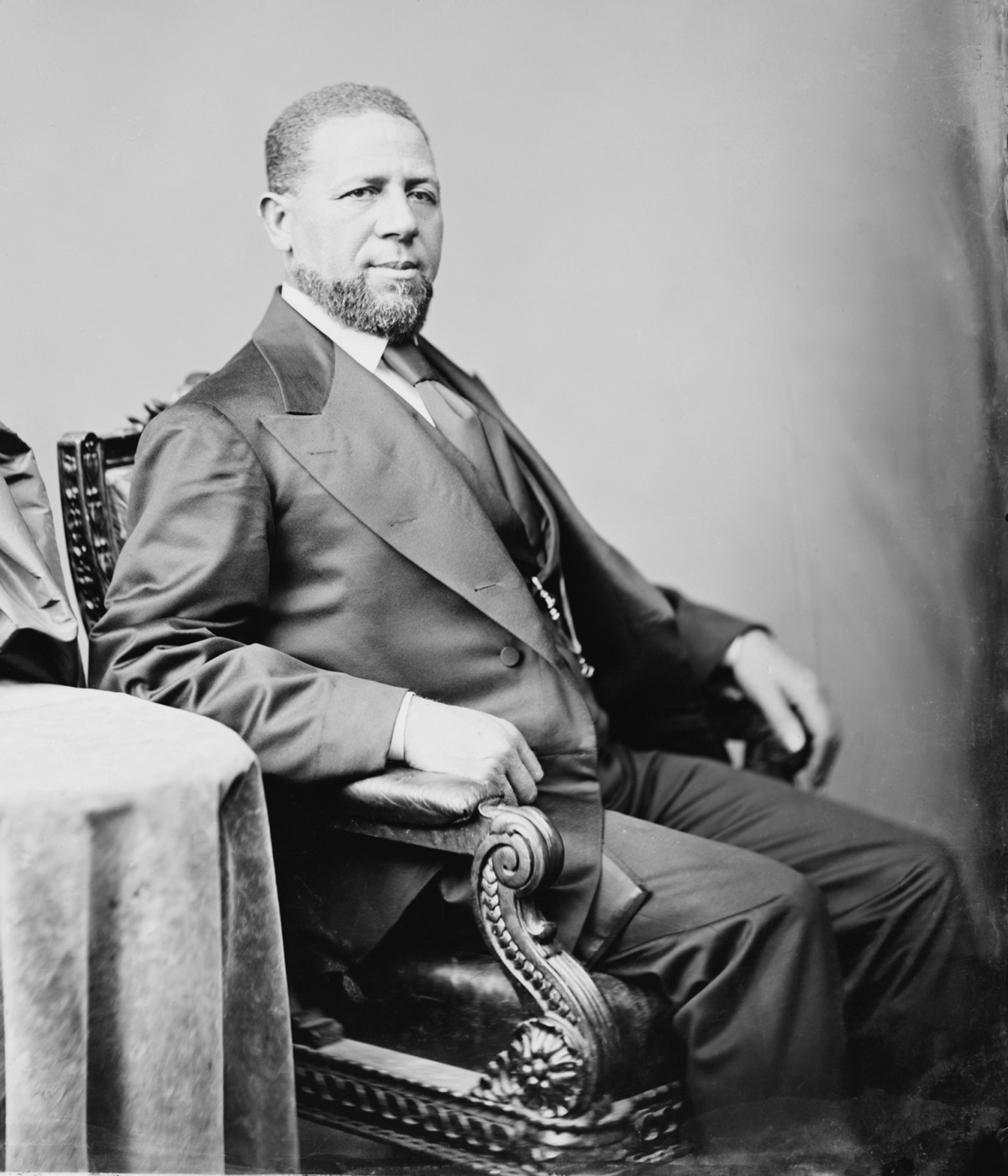Hiram Rhodes Revels was born to free parents, his father a Baptist preacher and Scottish mother in Fayetteville, North Carolina September 27, 1827. He was born in an era when educating Black children was illegal and he was forbidden from receiving state schooling as a mixed raced child. Later he was taught by a free Black woman and went to barber school to work as a barber for a few years. In 1844 he moved up North to attend Beech Grove Quaker Seminary in Liberty, Indiana at the Drake County Seminary for Blacks. A year later he was ordained as a minister in the African Methodist Episcopal (AME) Church.
Revels began his ministry in Richmond, Indiana where he was elected as an elder at AME Conference in 1849 after which he traveled around the country to teach in Indiana, Illinois, Kansas, Kentucky, and Tennessee. In 1853 Revels boldly settled in Missouri, a state where free Blacks were forbidden from living, to establish AME Church in St. Louis. Revels. There was arrested and imprisoned for preaching to blacks in 1854, for fear of his instigating uprisings among slaves in the communtiy. After being released Revels moved to Baltimore Maryland where he pastored at the Presbyterian Church alongside Willis Revels, another AME pastor. Revels also became a principal of a black high school in Baltimore, He later received a scholarship and attended Knox College in Galesburg, Illinois from 1855-57.
When Civil War began in 1861 and black soldiers were permitted to fight by 1862 and Revels assisted as a chaplain in the U.S. army recruiting for two black regimes in Maryland. Before the Civil War began less than 1000 free Blacks had access to education. It would take Blacks in representative positions to see any change this trend, inspiring Revels to become involved in politics although he was fearful that it would have a negative effect on his ministry. After being encouraged by future representative John Roy Lynch, born slave and later attorney, Revels won a seat in the Mississippi State Senate in 1869. He gave a moving prayer on the session’s opening day which included more than 30 African Americans among the states 140 senators. As a free black man in the Senate, Revels received petitions from blacks around the country, one of which included a petition to reinstate several Black legislators who’d been forced from office in Georgia.
Revels was a radical Republican and did not support forced racial mixing. He opposed Ohio Senator Allen’s amendment perpetuating segregated schools in the District of Columbia, but his views on desegregation were more optimistic than other Black leaders. Although he was clearly against de juré segregation, he did not believe that forced social mixing was the answer. He stated, “The colored race can be built up and assisted … in acquiring property, in becoming intelligent, valuable, useful citizens, without one hair upon the head of any white man being harmed.” Even today the black community credits assimilation to the historical lack of Black pride that’s been the case for centuries. It’s only been over the past few decades that Blacks have begun to understand their own culture. The desegregation focus of the Civil Rights movement pioneered by the Supreme Court decision in Brown v. Board of Education led to the forced desegregation of education across the country. But was Revel right about forced social mixing?
Decades later there are still black dominated schools in poor areas with inadequate classes, underpaid schools and run-down facilities. The legal precedent had been broken but de facto segregation remained, this time instead of being enforced by race it was upheld by class. Property value taxes now funded schools, as a result areas with wealthier residents had a wider variety of classes, higher paid teachers and more college bound students with higher graduation rates. Nothing truly changed socially there was just a dangerous shift in thinking that made the public think that problems were being resolved when they were actually just being re-designed and buried deeper within the American psyche. Poor Black kids’ access to education is just as limited today as it was prior to the Civil Rights movement. Revels was right.
In the same way that the plantation shifted to the prison, free forced labor moving from slaves to inmates according to the U.S. 13th Amendment, the basis for deficient education shifted from segregated black communities to impoverished communities, which was majority composed of minorities. American Socioeconomics was dependent on a free labor source, leading to the establishment of the public-school-to-prison pipeline to keep prisons populated securing a free labor source for companies that now include: Chevron, Victoria Secret, Starbucks, McDonald’s and others. Nothing has really changed. Evidently, Revels subtly about his views was a wise decision politically and socially. Although he stunned the Black community with his seeming lack of support for integrated racial equality, it wasn’t that, it was actually his passion for Black pride in individual community development that kept his discernment high. He was able to navigate a government build against him by refusing to distress the opposing party, during his time this was one of the best ways for him to make influential political strides. From Revels we can see that sometimes it takes subtly to make progress and discernment to recognize when the popular decision may not be the wisest.

